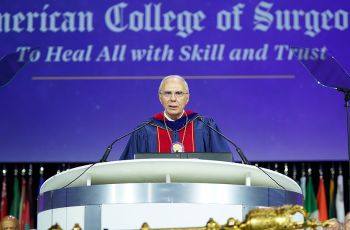During the outbreak of COVID-19, in order to protect our patients and access to needed hospital resources, The GW Medical Faculty Associates (GW MFA) and The George Washington University Hospital canceled all elective surgeries and procedures. As the disease has come under control in the DC area, we have returned to a new normal with an eye on serving our patients’ medical needs in a safe manner.
As we have resumed elective surgeries in accordance with guidelines from the Centers for Disease Control and Prevention (CDC) and other public health agencies, additional precautions have been put in place at both our clinics and GW Hospital to ensure patient and staff safety. The GW MFA and GW Hospital have extraordinary safety measures in place, and we look forward to partnering with you in your orthopaedic healthcare needs.
If you’re in need of joint replacement surgery - don’t wait too long or delay.
It’s understandable to be reluctant—joint replacement surgery is a significant procedure, and the recovery period can be difficult. Often people may want to put off surgery until they can’t stand the pain and stiffness anymore. But, that may not be the best situation for your health and quality of life.
Issues with delaying too long When you’re healthy - other than in your joint, people tend to often do much better recovering from surgery.
The greatest risk of delaying too long is allowing problems, such as osteoarthritis, to progress to a point where treatment becomes more complex. Most degenerative problems of joints only get worse with time, and may be associated with damage to the bone or excessive stiffness if allowed to progress further.
If you need a knee or hip replacement and you’ve tried physical therapy or other non-surgical treatment it is best not to delay for too long. Research shows that to gain the full benefit of your joint replacement – timing (as referenced in this recent study at Northwestern University) is everything.
To regain your quality of life and preserve your mobility, early intervention is preferable.
To schedule an appointment with your GW Orthopaedic Surgeon or to learn more,please call 202.741.3300
If you’re considering joint replacement surgery - what can you expect when coming in for surgery?
Before your joint replacement surgery, you and your support person who will help care for you at home following your surgery will be provided educational information and specific instructions for you to follow in the days leading up to your surgery, including logging your temperature, COVID-19 testing prior to surgery and recommended self-isolating.
Separation and Safety at the Hospital To maintain separation between our pre-tested surgical patients and others in the hospital, we have a dedicated entrance, operating rooms and pre/post op areas for planned surgical patients, and a contained inpatient unit for recovery.
Proactive Testing of Hospitalized Patients All patients admitted to GW hospital are tested for COVID-19, regardless of whether or not they have symptoms associated with a respiratory illness.
COVID-Contained UnitsFor those suspected or confirmed COVID-19 cases, we have assigned highly specialized teams in dedicated areas of our hospital to care for these patients. We have implemented strict isolation practices to separate COVID-19 patients from other patients in order to prevent spread within the hospital.
COVID-Clear Surgical CenterAt our GW Hospital ambulatory surgery center, we are only providing surgical and procedural cases for patients who have tested negative for COVID-19.
Cleanliness and Environment of CareGW Hospital utilizes robust infection prevention standards to keep all hospitalized patients safe. To enhance our already stringent efforts, we have increased our cleaning frequency of high-traffic areas and public spaces.
Visitation, Patient Drop Off and Pick upFor patient and staff safety, all of our waiting rooms remain closed. Your care team will provide updates to your support person during and after surgery via phone. Your support person will be kept apprised of when you’ll be ready to be picked up (the typical hospital stay for joint replacement surgery patients is one night). If appropriate, your surgeon may decide that you can go home the same day as your surgery. Your support person will be kept apprised of when you’ll be ready to be picked up (the typical hospital stay for joint replacement surgery patients is typically one night. If appropriate, your surgeon may decide that you can go home the same day as your surgery.
After SurgeryYour surgeon and you will determine what is best for your follow up care. Our Department of Orthopaedic Surgery has virtual health options in addition to in-person visits. Based on your needs, your follow-up care may be adjusted to include phone and video visits in addition to in-office visits.




